
Another reality: what would a just world and an egalitarian society look like?
Yanis Varoufakis and Daniel Lacalle
On 17 March 2021, the Rafael del Pino Foundation organised the dialogue "Another reality: What would a fair world and an egalitarian society look like?" with the participation of Yanis Varoufakis, former Greek Finance Minister and co-founder of the international movement DiEM25, and Daniel Lacalle, chief economist at Tressis.
Yanis Varoufakis said that capitalism is a fantastic system, there is no doubt about it. The problem is that it is full of contradictions. On the one hand, it has unleashed tremendous forces, such as creativity or production, which has resulted in the creation of huge amounts of wealth. But it has also generated new kinds of poverty that were unknown before capitalism. These contradictions are not static, but evolving, and they are its worst enemy. We no longer have capitalism, especially after 2008. We live in a very rare feudalism, with a lot of technology. Competition has been replaced by big business making money from the state. We have socialism for the few and feudalism for the many, which is not a very sustainable system. Those who first supported that capitalism do not recognise themselves in today's capitalism, which results in inequalities, in depravity between the poor and the rich, in an inability to take advantage of what exists to save the problem. Capitalism has already reached post-capitalism, which is not a pleasant place to live. The question is whether there is an alternative to capitalism.
For his part, Daniel Lacalle commented that capitalism has brought magnificent achievements. However, there is something in the current system that has nothing to do with capitalism, which is negative. It is cronyism, which is not a direct consequence of capitalism, but of statism, in the form of printing money, of public deficits, which has very little to do with the free market. There is an important starting point, and that is that the natural state of human beings is not wealth, but poverty. Wealth is not produced in one place and distributed, but created out of poverty. Capitalism does not create poverty, but enables people to leave it behind. What we are experiencing has very little to do with the free market. This is not due to the capitalist system, but to what we have been experiencing since the 1990s with the growth of the state. The dotcom bubble is the beginning of what has been a cronyism approach, which seeks to create an elite that eliminates the possibility of enjoying the multiple advantages of capitalism.
Varoufakis asks whether the problem of cronyism is the result of a failure of capitalism or a natural evolution of capitalism. To answer this question, one has to go back to 1900, when the big energy and industrial companies were created in the United States. As soon as such an economy is created, the economies of scale and the investment required are so enormous that a mega-bank is needed, which, by definition, creates money out of thin air. When things are going well, growth is fantastic, as in the 1920s, but if you create money out of nothing you have a bubble, as Hayek warned, and it bursts. Then the state comes in, produces more money, bails out the banks and creates cronyism. If capitalism creates these huge network platforms, can the competitive market be protected?
The natural state of man is not poverty, but the absence of wealth. When the British arrived in Australia, they were astonished by the quality of life of the Aboriginal Australians, who worked only two hours a day and enjoyed life the rest of the time. It was a prosperous but very rich life. Now they have more money, but they live in the kind of abject poverty that results from capitalism.
For Lacalle, however, the problem is the state, not capitalism. If the state creates a monopoly and then perpetuates it, we have a problem. The state did not create Amazon. Amazon is not a monopoly because being a market leader is not the same as being a monopoly. Neither is Google. The computer doesn't have Google as an option, you have to download it. I choose it because I choose it, the same as when I use Amazon. What proves that they are not monopolies is that they arise from destroying others that were monopolies. When capitalism works, it makes Walmart, an entity organised by the state, which subsidised it, fail when Amazon comes along and breaks the monopoly. In the future another will come along and replace Amazon, like Google replaced Yahoo.
Varoufakis disagrees. For him, what happens in capitalism is an evolutionary process, in which there are no monopolies, but oligopolies with great market power emerge. The state did not create them, but they emerged spontaneously and have a dominant power. This was the case of General Electric because Edison invented electricity, the light bulb, the electric oven. Once Edison created all this, he became dominant. What matters is that we have a company that has no competition, with an impressive margin, and, at the same time, it creates mega-banks. The banks created bubbles out of nothing. The state was not doing this, but came in with cronyism and saved the bankers, so private losses are covered by state money. That is the result of capitalism.
We have no answer to the alternative to capitalism. My liberalism, Varoufakis continues, is against all kinds of power, including that of business. Capitalism is a market-based system that depends on the labour market and the money market, which can never function well as markets. It does not like the state. It prefers one employee-one vote. Nor does it like elections because they are oppressive. For public decisions it is better to have a lottery to elect political representatives. How would a world work in which there is no accumulation of economic power and no state, with a digital currency system in which central banks collaborate with each other, with no one having too much power?
Lacalle clarifies that private banks do not create money out of thin air. Each unit of credit comes from investment in a deposit. The only one that creates money out of nothing is the central bank, which increases the quantity of money enormously. Then, through the mechanism of credit and very low interest rates it forces the banks to lend, now with negative rates it penalises them for being prudent. You have to try to remove the power at the same time as trying to remove the failures that generalise the dynamics of the market. By removing power, from consumers to workers to business leaders, there would still be large inequalities because those who are able to make better investments will be more powerful. By trying to remove power, you concentrate it, which is what the state and central banks have done with their interventions. This creates an even higher level of monopoly. In a car company, or in a refinery, there would be very little incentive to pursue innovation because most people would want to get rich by investing in producing more cars. Competition gives us the possibility to use market tools to achieve this. If we remove all that, we concentrate power in a central bank that we have to be very careful not to erode the purchasing power of wages and savings.
Varoufakis disagrees and says that savings now do not erode despite the issuance of money because there is no inflation. What Adam Smith is saying is that the fact that every entrepreneur tries to maximise his profit is what ensures that no one has power. He was a philosopher who was asked how he could support those entrepreneurs who use child labour. What he was saying is that the beauty of the market is that you compete, if there is competition it works, as if there is an invisible hand that makes banks do what they have to do. Capitalism works if nobody has power over prices, as Smith postulates.
What Varoufakis is trying to do is to create a template in which everybody is looking for power, but nobody has it. Elon Musk is a genius, he is an entrepreneur, but I don't think what motivates him to innovate is the hundred billion he has earned during the pandemic. He made it for the central bank, not because he came up with something new. The reason Bezos and Musk now have a trillion dollars more is because the Fed has printed money. In the corporation he draws in his book, there is room for business, there is room for leadership. If the company makes money, there is a process that gives rise to the bonus, there is an incentive. He is not against inequality. Most of the wealth that accumulates in this techno-feudalism is rent, not income from working and doing things well. Finally, the process by which power is concentrated in the central bank is the natural repercussion of what the bankers do. The money that the banks create comes out of thin air. When the bubble bursts, it gives exceptional power to the central bank to try to prevent a crisis.
The Rafael del Pino Foundation is not responsible for the comments, opinions or statements made by the people who participate in its activities and which are expressed as a result of their inalienable right to freedom of expression and under their sole responsibility. The contents included in the summary of this conference are the result of the debates held at the meeting held for this purpose at the Foundation and are the responsibility of their authors.
The Rafael del Pino Foundation is not responsible for any comments, opinions or statements made by third parties. In this respect, the FRP is not obliged to monitor the views expressed by such third parties who participate in its activities and which are expressed as a result of their inalienable right to freedom of expression and under their own responsibility. The contents included in the summary of this conference are the result of the discussions that took place during the conference organised for this purpose at the Foundation and are the sole responsibility of its authors.
Latest frptv
-
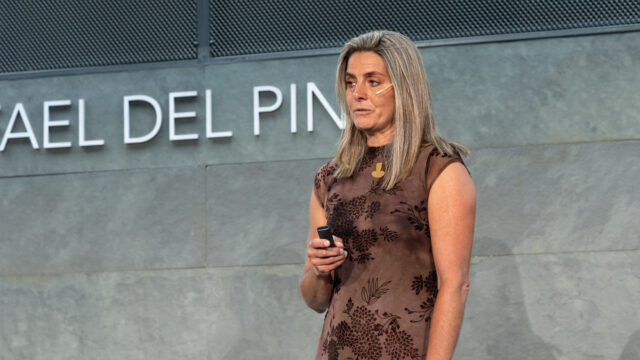
GEM SPAIN 2024/2025 Report
-
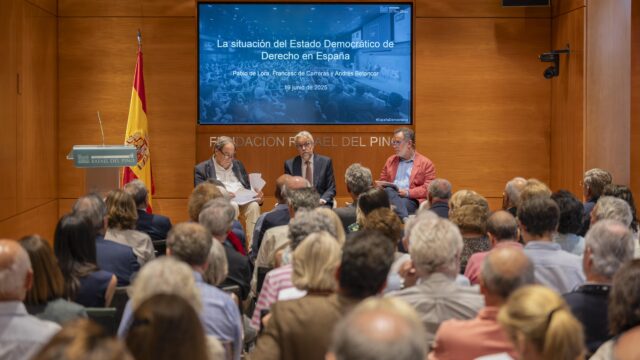
The situation of the democratic rule of law in Spain
Pablo de Lora, Francesc de Carreras and Andrés Betancor
-
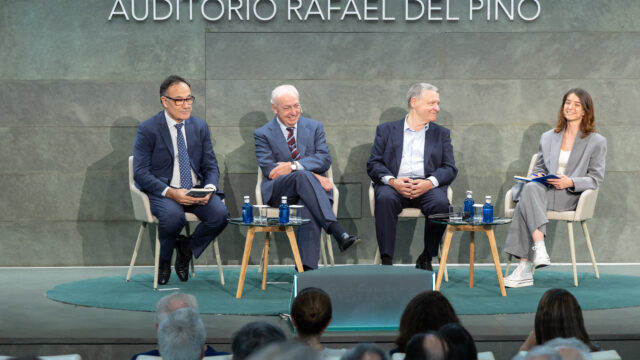
Energy and competitiveness in Spain and Europe
Pedro Antonio Merino, Jordi Sevilla Segura, Nemesio Fernández-Cuesta and Paula María Álvarez
-
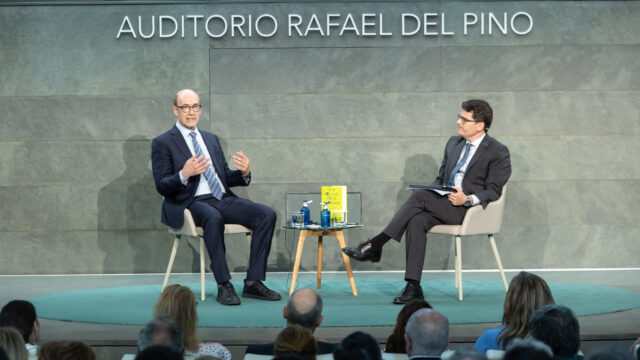
Past, present and future? in the reign of the world's dollar
Kenneth Rogoff and Joaquín Artés
-
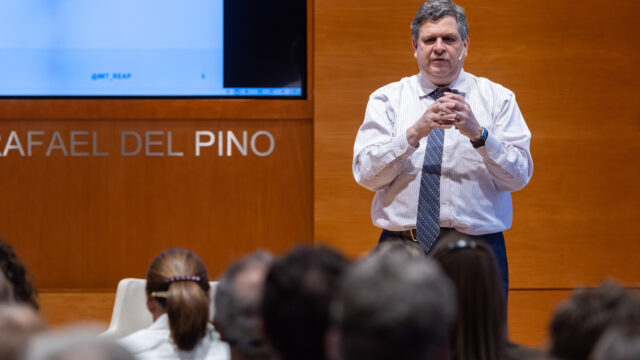
Frontiers of entrepreneurship and innovation
Scott Stern
-
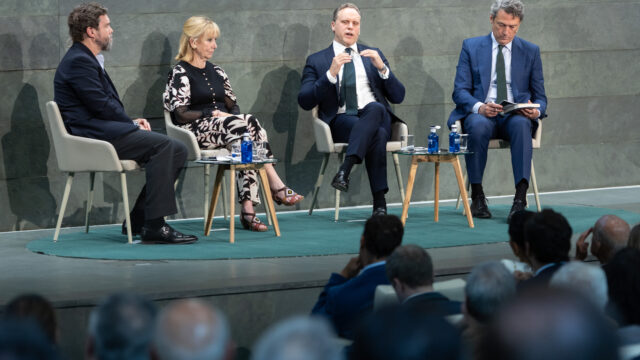
The new world economic order
Daniel Lacalle, Esperanza Aguirre and Iván Espinosa de los Monteros
-
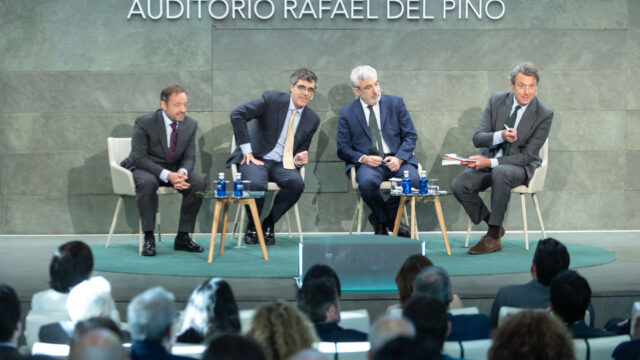
Territorial privileges in Spain
Jesús Fernández-Villaverde, Luis Garicano and Francisco de la Torre
-
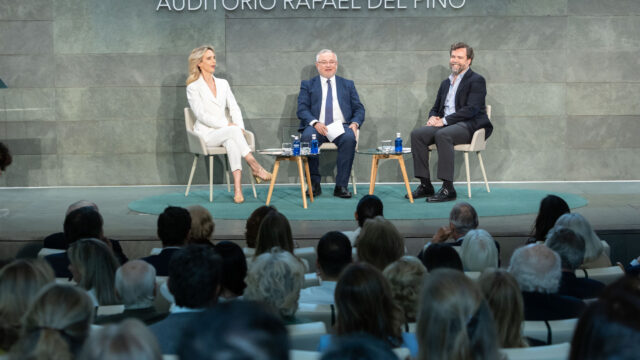
An optimistic view of Spain and Spaniards
Cayetana Álvarez de Toled, Iván Espinosa de los Monteros and John Müller

